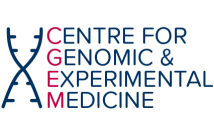Reverse Transcriptase Inhibitors for Interferonopathies
A recent award of a £1.7 million MRC Experimental Medicine Challenge grant to Professor Yanick Crow will assess a novel drug treatment approach for Aicardi-Goutières syndrome. May 2019

Aicardi-Goutières syndrome (AGS) is a severe childhood inflammatory disease of the brain associated with high levels of the chemical type I interferon. The disease is one of a number of so-called interferonopathies – conditions associated with interferon-mediated inflammation.
Normally, type I interferon is one of the body’s first lines of defence against viral infection, a response initiated by the immune system sensing the presence of viral nucleic acid. Although essential in the fight against viruses, the existence of such a response poses a potential biological difficulty – how to ensure that these viral sensors efficiently differentiate viral nucleic acid from the nucleic acid found in our own cells.
Up to 40% of the DNA in our cells consists of remnants of ancient viruses, incorporated into our own genetic material over millions of years, termed ‘endogenous retroviruses’ (sometimes also referred to as ‘junk DNA’). Some of these endogenous retroviruses still possess the potential to act like a virus coming from outside the body, and so there is a need for mechanisms to limit their reproduction. It is believed that in AGS, mutations affecting the function of particular proteins result in a failure of the control of endogenous retroviruses. In turn, the generation of nucleic acid from these retroviruses effectively results in a misrecognition of self as (viral) non-self, and the continuous production of damaging levels of interferon.
Yanick Crow based in the Centre for Genomic and Experimental Medicine, with co-investigators Tamir Chandra, David Hunt and Jose Luis Garcia-Perez from the MRC Human Genetics Unit, John Norrie from the Edinburgh Clinical Trials Unit and Jay Shetty based in the Neurology department of the Royal Hospital for Sick Children, have recently been awarded an MRC Experimental Challenge grant to test a possible treatment for AGS.
The team based in the MRC IGMM will investigate the potential use of a class of drugs called Reverse Transcriptase Inhibitors (RTIs) as a treatment for AGS. RTIs are very safe drugs, currently prescribed to millions of people all over the world, as they are used to treat (the exogenous retrovirus) HIV-1, which causes AIDS. Based on a recent paper published by the Crow group in the New England Journal of Medicine, the team wish to further explore the possibility that RTI treatment can control the endogenous retroviruses that are hypothesised to drive interferon production in patients with AGS.
If we see a treatment effect in AGS, this could have a very important impact for patients with the disease. That is to say, translation of our work into clinical practice might be possible in the short-term. Of note, there are other diseases also associated with enhanced type I interferon upregulation where such a strategy might also be considered.
The Experimental Challenge grant initiative was set up by the MRC to support ambitious programmes of research into disease pathophysiology in humans. The funding aims to address some of the gaps in our understanding of the causes and progression of disease.
This is an ambitious experimental medicine project in rare inherited diseases (interferonopathies) that aims to address fundamental scientific questions about genetic mutations that underlie disease in humans. The outcomes of this research could have significant clinical impact, including the encouraging prospect of identifying existing, safe drugs as effective treatments for people with these rare diseases.


